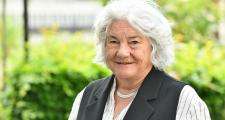Why we should be involved in discussions around transgender

I was pleased to see the excellent coverage in the May/June edition of PSW under the headlines ‘Our voice was missing in trans debate’ and ‘Why have we been so quiet on puberty blockers?’
As our chief executive Ruth Allen commented in the same edition, we have been quietly and closely involved, from the outset, in the Cass Review in making comments and suggestions, especially on the importance of taking a child and adolescent-centred approach and on the role of social work.
As chair of BASW, I have been involved in a number of round table events commenting on the outcomes and recommendations. I have drawn on my background in working with children and families and people who have identified themselves as trans.
A while back, I was fortunate enough to spend a year on post-qualifying training at the Family and Group Analysis, the predecessor to the Gender Identity Development Service (GIDS) at the Tavistock and Portman NHS Foundation Trust. This focused on whole systems approaches to working with families. The reason for not sharing more widely was because of the desire by the Cass Review to maintain confidentiality given the highly contentious nature of some of the debate around these issues.
We have been a key body as social work contributor, engaging alongside the significant other professional bodies, including the Royal College of Paediatrics, Royal College of Psychiatrists, Royal College of Nursing and the Royal College of GPs.
Our input has been listened to and valued, although at this stage it is inevitable that, given the nature of the issues, clinical and medical interest and views have dominated. I believe we are now in a position to move on and look forward to us doing so with the full engagement of all members.
Back to the PSW questions, we need to read beyond the headlines. If we do so, we will see that the social worker interviewed, Kay Beaumont, says “considering the whole child and treating them as an individual is what we do”. She is right.
We must now assess BASW’s ongoing commitment and action, including partnership engagement with other social care/work bodies, possibly in an alliance and, of course, with our members, ensuring the focus is on children, families and young people first and foremost.
We have already had an approach from one such body, the Association of Child Protection Professionals. The Cass Review has also requested that we further consider the safeguarding aspects.
The disconcertingly poor record of both gathering and using data at Tavistock’s GIDS is well documented. As a profession, we must rely on the use of analytic frameworks and strengths-based practise. It is hard to reach firm conclusions without good data.
We understand informally, that recent data is showing that a number of current referrals are ‘social care related’. Once we have access to the data, possibly of a safeguarding nature, we must explore this further.
My thoughts are the following: we have a professional responsibility and a duty of care to children and young people caught up in what is a distressing and confusing time. We have a professional responsibility to support and offer guidance to social workers, our membership and beyond. We have much to offer by reaching out to other professionals to support a multi-disciplinary team approach.
Clinicians, nurses, teachers and others, let alone families, need our help, through the unique perspective offered by social work; this is a unique opportunity for us to offer training and guidance to others. There is no-one else better placed to take this forward and we should do it in partnership with other the other professional bodies mentioned above as well as the Association of Directors of Children’s Services. And we must at all times work in partnership with others in a collaborative alliance.
I believe we cannot wait any longer for the landscape to clear and the dust to settle. Recent reports in the press indicate that the debate on gender reassignment has not gone away. However, the Cass review recommendations set out a different approach to healthcare, more closely aligned with usual NHS clinical practice that considers the young person holistically and not solely in terms of their gender-related distress. The central aim of assessment and further actions should be to help young people to thrive and achieve their life goals.
I look forward to the leadership of BASW’s policy, ethics and human rights committee in taking the next steps with our membership to drive this important matter forward.
